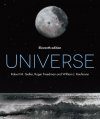About this book
Universe by Robert M. Geller and Roger Freedman strikes the right balance between scientific rigor and student comprehension and excitement.
Universe provides all the detail you need to prepare students for engaging with the astronomical ideas and theories, while also inviting students in through stunning visuals and relatable narratives.
New to the 11th edition:
- Sapling Plus for Universe Combines the highly supportive homework of Sapling Astronomy, complete with hints, targeted, answer-specific feedback, and detailed solutions for every question, with LearningCurve adaptive quizzing and the accessible VitalSource eBook
- New Interactives and Animations help students visualize and interpret concepts, now available with assessment in Sapling Plus for assignment before class or for additional study or homework
- New Guest Essays: Seven New Guest Essays on topics including multi-messenger astronomy, neutron star mergers, and climate change (Chapters 8, 11, 21, 23, 24, and 26)
Contents
1. Astronomy and the Universe
2. Knowing the Heavens
3. Eclipses and the Motion of the Moon
4. Gravitation and the Waltz of the Planets
5. The Nature of Light
6. Optics and Telescopes
7. Comparative Planetology I: Our Solar System
8. Comparative Planetology II: The Origin of the Solar System
9. The Living Earth
10. Our Barren Moon
11. Mercury, Venus, and Mars: Earthlike yet Unique
12. Jupiter and Saturn: Lords of the Planets
13. Jupiter and Saturn’s Satellites of Fire and Ice
14. Uranus, Neptune, Pluto, and the Kuiper Belt: Remote Worlds
15. Vagabonds of the Solar System
16. Our Star, the Sun
17. The Nature of the Stars
18. The Birth of Stars
19. Stellar Evolution: On and After the Main Sequence
20. Stellar Evolution: The Deaths of Stars
21. Black Holes
22. Our Galaxy
23. Galaxies
24. Quasars and Active Galaxies
25. Cosmology: The Origin and Evolution of the Universe
26. Exploring the Early Universe
27. The Search for Extraterrestrial Life.
Customer Reviews
Biography
Roger A. Freedman is a Lecturer in Physics at the University of California, Santa Barbara, USA. At UCSB, Dr. Freedman has taught in both the Department of Physics and the College of Creative Studies, a branch of the university intended for highly gifted and motivated undergraduates. He has published research in nuclear physics, elementary particle physics, and laser physics. In recent years, he has helped to develop computer-based tools for learning introductory physics and astronomy and helped pioneer the use of classroom response systems and the "flipped" classroom model at UCSB. He is co-author of three introductory textbooks: University Physics (Pearson), Universe (Freeman), and Investigating Astronomy (Freeman).
Robert M. Geller teaches and conducts research in astrophysics at the University of California, Santa Barbara, USA. Using data from the Hubble Space Telescope, he is currently involved in a search for bursts of lights that are predicted to occur when a supermassive black hole consumes a star. Dr. Gellar als has a strong emphasis on education, and he received the Distinguished Teaching Award at UCSB in 2003.
William J. Kaufman III (deceased) was the author of the first four editions of Universe. During his career he held positions at the Griffith Observatory in Los Angeles, San Diego State University, UCLA, Caltech, and the University of Illinois. A prolific author, his many books include Black Holes and Warped Spacetime, Relativity and Cosmology, The Cosmic Frontiers of General Relativity, Exploration of the Solar System, Planets and Moons, Stars and Nebulas, Galaxies and Quasars, and Supercomputing and the Transformation of Science. Dr. Kaufmann died in 1994.


































